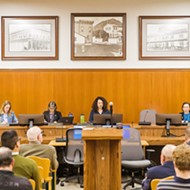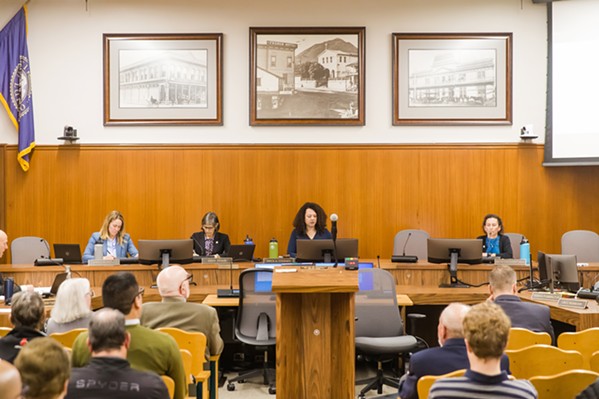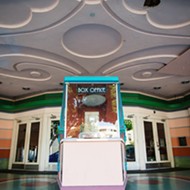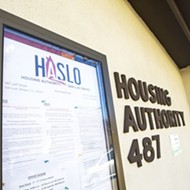Soaring appeal fees leave SLO residents worried about feeling the pinch when participating in the public input process
By Bulbul Rajagopal[
{
"name": "Newsletter Promo",
"id": "NewsletterPromo",
"class": "inlineCenter",
"insertPoint": "4",
"component": "15264767",
"requiredCountToDisplay": "0"
},
{
"name": "Ad - Medium Rectangle CC01 - 300x250 - Inline Content",
"class": "inlineCenter",
"insertPoint": "8",
"component": "15582119",
"requiredCountToDisplay": "12"
},{
"name": "Ad - Medium Rectangle LC01 - 300x250 - Inline Content",
"class": "inlineCenter",
"insertPoint": "18",
"component": "15582122",
"requiredCountToDisplay": "22"
},{
"name": "Ad - Medium Rectangle 9 - 300x250 - Inline Content",
"class": "inlineCenter",
"insertPoint": "28",
"component": "15582121",
"requiredCountToDisplay": "32"
}]
San Luis Obispo resident Kathie Walker and her husband are familiar with the effects of sharing their Alta Vista neighborhood with bacchanalian fraternities.
An emergency medical services pilot, Walker's husband works between 12 and 14 hours daily. Frequent rowdy college parties steadily get in the way of shut eye.
"He only has 10 hours to commute, to shower, to eat, and when there's a fraternity party blaring, I mean, our house is 100 years old with single-pane windows," Walker told New Times on June 27. "We can hear these fraternity parties, and he's not able to sleep. So, then he's not rested, and it's not safe for him to fly his medical patients."
She isn't alone in her desire to improve the quality of life for residents living in communities that also house college students. Residents for Quality Neighborhoods President Sandra Rowley proactively worked to prevent that kind of late-night disruption when it came to a nascent fraternity.
On June 24, Rowley filed an appeal of the SLO Planning Commission's approval of Lambda Chi Alpha's conditional use permit application to set up a fraternity for up to 24 people through four residential buildings on East Foothill Boulevard and Monte Vista Place. Rowley and other Residents for Quality Neighborhoods members like Walker want the city to change the conditional use permit's language to eliminate the implication that the city noise ordinance can be flouted after 10 p.m. with a special use permit. The conditional use permit must also be edited, according to Rowley's appeal, to limit the occupancy to 24 people during quiet hours and add a threshold of citations or violations that triggers a Planning Commission review of the fraternity.
But filing appeals like Rowley's has gotten more expensive over the years. In 2017, it cost $281 to appeal a decision to the SLO City Council. After a fee study that year, the appeal cost rose to $623 with an additional 2.7 percent Informational Technology surcharge. Since July 1, 2017, appeal fees have risen automatically to reflect annual changes in the Consumer Price Index. In June 2024, Rowley shelled out $745 to file the Residents for Quality Neighborhoods' appeal. She didn't respond to New Times' request for comment.
Now, appeal fees are going to leave larger dents in SLO residents' wallets. As part of a routine fee study delayed by the COVID-19 pandemic and staff turnover, SLO City Council voted 4-0 on July 2—with Councilmember Jan Marx absent—to raise appeal fees to $2,507.
"There's really not a lot of joy in raising fees," Mayor Erica Stewart said at the meeting. "This is not, 'Yay, we can't wait to raise fees.' We have to get to the point where we recover more of the funding so that the people who are actually getting the services are paying for the services."
Director of Community Development Timothea Tway told New Times prior to the meeting that the fee study usually takes place every five years and analyzes user fees, excluding development impact fees. The fee study is meant to show the reasonably estimated true cost of providing certain services to the public.
"Since it's been seven years, labor rates have gone up, overhead has gone up," she said. "Cross support rates have gone up, and potentially also the number of hours that staff is estimating something takes also could have gone up."
City staff estimated that it costs them $17,038 and $16,711 when applicants and non-applicants, respectively, file tier 1 appeals. That tier comprises appeals to the City Council, major development reviews, subdivision tract maps greater than five lots, and permits that go before the Planning Commission.
Assistant City Manager Whitney McDonald told councilmembers on July 2 that while city costs have increased by 33.6 percent since the last fee study and the Consumer Price Index and California Construction Index rose by 26 percent and 43.3 percent, respectively, user fees only grew by 21.9 percent.
Originally, city staff recommended recouping funds by setting the tier 1 appeal fees at 20 percent of the full $17,038 cost of service for non-applicants and at 50 percent of the full rate for applicants. In other words, non-applicants would have to pay almost $3,500 to appeal a city decision while applicants would have to cough up $8,356.
Similarly, tier 2 applicants and non-applicants—those appealing administrative use permits, minor and moderate development reviews, and lot line adjustments—would have to pay $5,259 and $2,070, respectively. Appealing decisions on sidewalk cafés and parklets, home occupation permits, nonprofit special events, and sidewalk sales permits—tiers 3 and 4—would be charged $1,287 or $674 depending on the tier.
City staff's recommendation sparked the ire of numerous residents, including SLO resident Walker. She told New Times that she'd be forced to pay high appeal fees if she ever decides to take legal action against city officials' response to fraternities.
"I have to exhaust all my remedies before I can even go to the court," she said. "The law says that I first have to appeal to City Council, and then if I don't like their decision, then I can go to the court. ... I think that's the part of this that bothers me the most, is that it's sort of shutting down the democratic system."
Former Planning Commission member Richard Schmidt called the appeal fee hike a "great example" of death by process.
"It's [fee study] done by staff, supposedly with the advice of a consultant," he said. "You end up with a values-free proposal that considers nothing other than whatever the desires of the staff who want this to happen. There's no consideration for public good, and I'm sorry, they do profess that that is a part of it, but it really isn't."
City staff processed 14 appeals in the last five years, according to Community Development Director Tway, but appeals aren't the only way to be a part of the public process. Public output, outreach, and hearings help decisionmakers at the city too.
"I absolutely understand kind of all the arguments across the board and that the numbers we are seeing in the fee study are showing the true cost, but the fee itself could be set at any level," she told New Times.
Following a handful of complaints from community members during the public comment period, the City Council tried to balance its constituents' needs with city staff recommendations.
Council members removed categorizing appeal fees for applicants and non-applicants. Instead, they set the appeal fees at 15 percent of the total cost of service for all applicants. Starting Oct. 1, the new appeal fees for tiers 1, 2, 3, and 4 will be $2,507, $1,578, $772, and $405, respectively.
"I could see that 20 percent ... gets a little bit more cost recovery," Mayor Stewart said. "I also don't want to see it keep going up, up, up, so that we end up boxing out ... average people who are just trying to live next to this potentially giant project coming in next to them." Δ
Reach Staff Writer Bulbul Rajagopal at [email protected].
Correction: In the previous version of this story, New Times stated the incorrect kind of surcharge added to the appeal cost. New Times regrets the error.
Latest in News
Readers also liked…
-

When the levee breaks: Oceano residents, county officials walk a tightrope of regulations to manage Arroyo Grande Creek, which some say led to the levee's failure in January
May 18, 2023 -

Cal Poly report highlights offshore wind's potential to spur green energy transition
Jun 8, 2023 -

Cal Poly students demand rent control, accountability for substandard housing from SLO City Council
Jun 22, 2023









